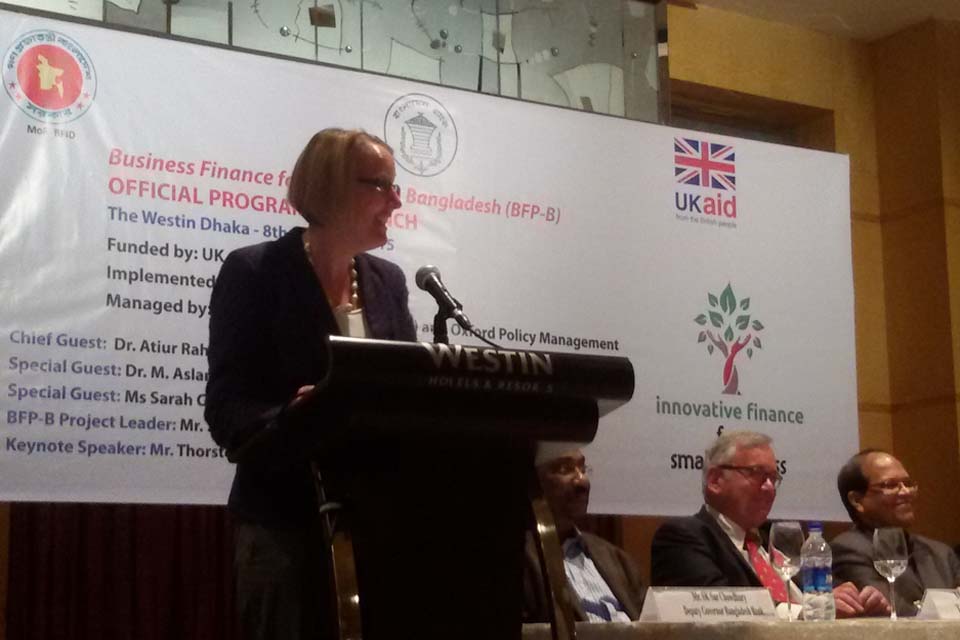Launch of Business Finance for the Poor in Bangladesh (BFP-B) project
Speech during the launch of the UKaid funded project.

Honourable Governor of Central Bank, Dr Atiur Rahman, Secretary of Bank and Financial Institutions Division, Dr Aslam Alam; ladies and gentlemen.
It is a pleasure for me to represent the UK at this launching event for the new ‘Business Finance for the Poor’ programme.
I’m also delighted that the Honourable Governor is able to join us this morning. I know he is straight off a plane from London and would like to congratulate him on being awarded the prestigious Central Banker of the Year – Asia/Pacific - from The Banker magazine.
The UK Government’s development programme works in Bangladesh to improve the living standards of the poor. To this end, the UK has been working with Bangladesh since its independence. Our work covers a wide range of areas from health and education and lifting people out of extreme poverty to reducing the impacts of climate change and improving governance.
An increasingly important part of our work now also centres on growth and economic development.
When I travel round Bangladesh, I ask the poor people that I meet what will make the biggest difference to their lives? It is no surprise that most of them tell me they want a job.
It is jobs and rising, predictable incomes that have lifted millions out of poverty in Bangladesh – and will continue to do so in the future.
As part of our work on economic development, the UK is undertaking a number of important activities. We work to improve the investment climate, to develop markets and to build skills. But a consistent part of our portfolio for many years now has been our work in the financial sector.
DFID and Bangladesh Bank have been working together since 2006 to improve the flow of remittances into Bangladesh and to educate migrants and their families about the most efficient ways to send and use remittances. We supported the automation of the Bangladesh Automated Clearing House which sped up not only the flow of remittances but all payments throughout the country. Its impact on the efficiency of the entire financial sector has been widely noted.
We also supported the automation of the credit information bureau in the Central Bank which has significantly reduced the time needed for a credit history check.
We fund the recently launched Global SME Financing Facility which targets increased lending to under-served SMEs through a number of commercial banks.
We also work with PKSF, Microcredit Regulatory Authority and Institute of Microfinance through the Prosper programme with the ambition to make microfinance more innovative and appropriate for emerging groups of borrowers – again, helping to transform the lives of some of the poorest people.
These large-scale grant finances demonstrate DFID’s strong commitment to Financial Sector Development – here and globally.
In total, DFID has invested roughly £350 million over the past 6 years in Financial Sector Development through our global, regional and country programmes. At the global level, DFID’s approach has been to pilot innovation especially using technology; respond to key thematic gaps, such as financial information infrastructure; and support global advocacy e.g. through the G20 process.
This investment and advocacy is helping countries like Bangladesh – and the poorest citizens in those countries – to seek new economic opportunities and build better lives.
We all know that micro and small enterprises cut across a wide set of economic activities and employ large numbers of people. I am delighted that the Business Finance for the Poor programme will push the boundaries of traditional lending. It will work with banks, MFIs and others to ensure that viable micro and small enterprises get the financing they need to survive and grow.
The programme is unique in the three-pronged way it has been designed to solve the fundamental problem:
- At the macro level, it will work with policy-makers and other experts in the sector to make sure the right policies, rules and regulations are in place;
- At the meso-level, it will work with providers of finance to encourage innovative and sustainable lending models.
- At the very individual level, it will make sure borrowers are ready to take on loans and understand the implications.
It will aim to encourage the financial sector to provide $95 mln in additional loans to previously excluded micro and small enterprises and help create 33,000 jobs.
I would like to take this opportunity to convey my sincere thanks to the Governor and the Secretary and their teams for providing such strong support to this programme to date and especially during the development stage.
I hope the programme will be able to accomplish great results by working with all the different stakeholders we have in the room with us today. I look forward to all your support in making this programme a success.